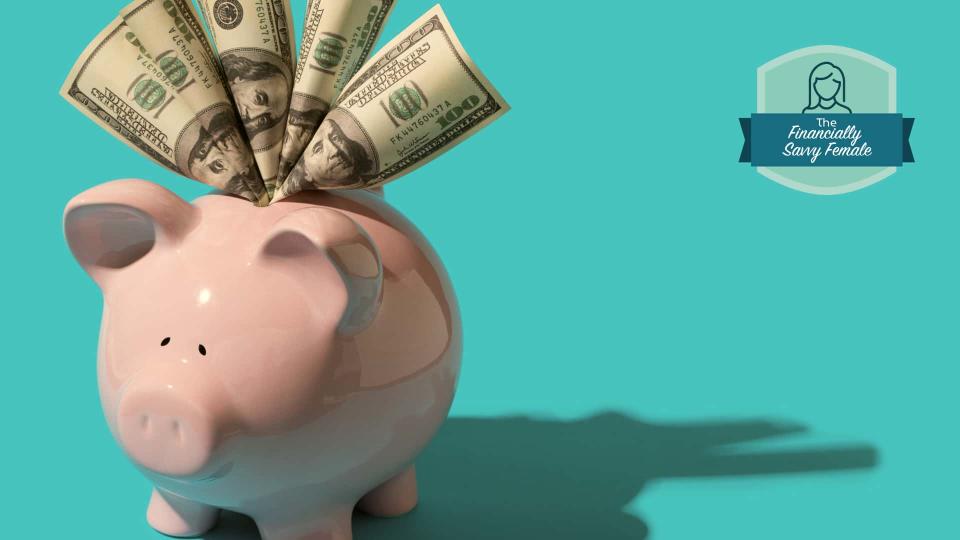Why It Can Be Harder for Women Than Men To Save Money — And How They Can Change That

In general, women face more difficulty saving than men do — a problem the pandemic has only exacerbated. A recent GOBankingRates survey showed that as many as 40% of women have $100 or less in their savings accounts, but the same is true for only 26% of men.
Keep Reading: Experts: Here’s How Much You Should Have In Your Checking Account
Check Out: 15 Most Important Assets That Will Increase Your Net Worth
That statistic becomes less surprising when you learn that only 14% of women think they know a lot about saving and investing, according to Fidelity Investments’ 2021 Women and Investing Survey. The same survey revealed that only 47% of women who earn over $50,000 a year say they have $20,000 or more saved outside of retirement and emergency funds.
Why is it harder for women to save than men? Here’s what studies show and what financial experts have to say.
Women Tend To Earn Less Than Men
“Women, as compared to men, are often more challenged to save money because they are usually less financially literate and likely to be in charge of their finances while earning less,” said Alissa Krasner Maizes, a financial planner, licensed investment advisor and the founder of Amplify My Wealth.
Women earn only 82 cents for every $1 that men earn, according to the U.S. Census Bureau. This discrepancy holds across almost all industries, and as women age, the gap gets even wider. Only in a handful of occupations — such as healthcare social workers — do women earn slightly more than men do.
For non-white women, this pay gap is even more acute, according to Census data. Black women earn only 63 cents and Hispanic women only 57 cents for every $1 that white, non-Hispanic men earn.
“It’s essential that when looking for a new employer, starting a new business, or increasing their cash flow, women recognize their value beforehand,” Maizes said. “It’s crucial to take the time to write down the value they provide and research what other people–men and women–with similar expertise get paid for delivering the same value. If they ask for a raise and still do not get the wages they deserve, they should ask to be reconsidered for a raise within a set time or look for a new position elsewhere.”
Save More: Unplug These Appliances That Hike Up Your Electricity Bill
Women Are More Likely To Be Caretakers Than Men
Women have made considerable strides in closing the pay gap over the last several decades. But the U.S. Census Bureau reports that the pandemic has stalled those efforts as a lack of child care has forced many women to leave the workforce.
After all, women are more likely to leave their jobs to care for their children than men are. A 2016 Pew Research study showed that at the time, 27% of mothers were stay-at-home moms compared with 7% of fathers who were stay-at-home dads.
Beyond caring for children, as many as 25.4% of women are caregivers to friends or family with a health problem or disability compared with only 18.9% of men, according to the CDC.
“When women pause their careers, they should continue to invest in themselves by keeping their relationships with potential employers or clients open for future opportunities,” Maizes said. “A great way to leave the door open is to have a LinkedIn account to showcase their skills and experience, connect with people, and build and foster relationships.”
How Women Can Save $20,000 More Efficiently
Despite these economic challenges, women still can — and should — aim to save for their future. Olivia Tan, a personal finance coach and co-founder of CocoFax, said automating your savings is a crucial first step.
“The best way for women to save $20,000 is to open a savings account and set up automatic contributions,” she said. “Have the savings contribution drafted electronically into your savings account before you can spend it. Even though it may seem like a painful deprivation at first, it will get easier as you get used to not having those funds to spend.”
Maizes agrees and recommends opening different kinds of accounts based on your various savings goals.
“I recommend opening a high-yield saving account separate from other money and accounts for short-term goals,” she said. “But when saving money for long-term goals at least 10 years in the future, such as retirement, it is best to invest in a well-diversified portfolio of low-cost mutual funds and ETFs and consider tax-advantaged accounts.”
More From GOBankingRates
Waiting on Tax Refund? What 'Return Being Processed' Status Really Means
Social Security Schedule: When First COLA Checks Will Arrive in March 2022
This article originally appeared on GOBankingRates.com: Why It Can Be Harder for Women Than Men To Save Money — And How They Can Change That

 generic
generic 